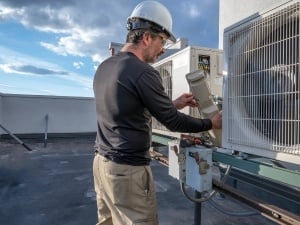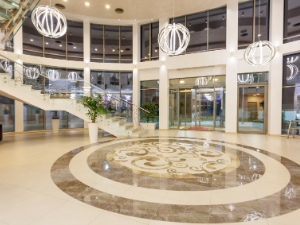Winterize Your Commercial Building: 8 Expert Tips
.jpg)
Prepare your commercial property for winter with expert tips on roof inspection, insulation, HVAC maintenance, and more. Keep your property safe and comfortable. As a commercial property owner, you need to ensure that your property is winterized every year to ensure its longevity and maintain a comfortable working environment for your tenants. With the cold season just around the corner, now is the time to take proactive steps to safeguard your property. This article provides expert advice on how to winterize a commercial property effectively. Taking a look at the top 8 tips will help you prepare your property for winter.
Commercial property and facility managers have a tough job. When problems arise in a building, whether it's a carpet cleaning or a burst pipe, it’s up to property managers and facilities managers to get issues fixed – and quickly.
That’s why preventative maintenance is critical. In the Northeast, old man winter can wreak havoc on a facility, so preparing your building now is key to avoiding a costly disaster that could disrupt business.
We researched and found numerous property and facility managers sharing their top recommendations for winterizing any commercial property.
In this article, you'll gain knowledge from multi-decade experts, who specialize not only in property management, but also janitorial industry leaders. System4 IPS is here to help you prepare, avoid mistakes and pitfalls, not just during the winter but all year long.
FAQs
- Why is winterizing my commercial property important?
- Can I perform roof inspection and repairs myself?
- What is the best time to start winterizing my property?
- How often should I maintain my HVAC system?
- How can I prevent frozen pipes in my property?
1. HVAC SYSTEM MAINTENANCE
Optimizing Heating Efficiency
Regular maintenance of your heating, ventilation, and air conditioning (HVAC) system is vital to keep it running efficiently during the winter. Clean the ducts, replace the air filters, test freeze stats in air handlers, and ensure that all of the parts of the system are in good working condition. A well-maintained HVAC system guarantees a comfortable environment for everyone on your property. It is common for HVAC systems to be professionally inspected biannually in the northeast.

Rooftop units and furnaces should not be overlooked. Check for cracks in the heat exchangers and consider replacing furnaces older than ten years for the best efficiency rating.
Water heaters will see increased use in the Northeast winter, check them to ensure proper operation. Examine water heaters for buildup, cracks and correct pressure calibration. Remove and clean the burners as well as brush boiler tubes so that the heater can run efficiently.
Drop the temperature. Save energy and money by calibrating your building’s thermostats by lowering them to a cooler temperature. Choose a temperature that is still comfortable for the building occupants. Studies show your costs are reduced by an average of 1% for every degree dropped. Consider the savings!
2. WEATHERSTRIPPING AND INSULATION
Keeping the cold out and the warmth in
For retaining heat during the winter months and reducing energy costs, proper insulation and weatherstripping are essential. Ensure that your property's windows and doors do not have any gaps or drafts around them. You need to seal the gaps with weatherstripping, and you might want to consider adding some insulation to the attic and walls. Adequate insulation keeps the cold at bay, making your property energy-efficient. Adding insulation and weatherstripping can help lower your energy bills by up to 30%. It also helps to protect the environment by reducing carbon emissions. Plus, it can help reduce noise levels inside your workplace.
3. PROTECT PLUMBING
Prevent Frozen Pipes and Costly Repairs
There can be a significant amount of damage and costly repairs caused by frozen pipes. Insulate exposed pipes as much as possible, especially in unheated areas, in order to avoid this. When the weather is extremely cold, it is a good idea to let faucets drip slowly to prevent them from freezing. Regularly check for leaks and fix them promptly to conserve water and prevent damage.
4. PREVENT FLOOR DAMAGE WITH WALK-OFF MATS
Reduce the Impact of Outdoor Elements
Walk off mats can reduce up to 98% of debris from shoes while protecting flooring. See more statistics about walk off mats here. Your entryway is an important first impression to customers, staff and community. Snow and salt can wreak havoc to your floor, tile, and commercial carpeting. If you’re looking for an effective way to remove road salt stains on your floor mats or carpet, watch what this expert recommends:
5. ROOF INSPECTION AND REPAIR
Understanding the importance of a sturdy roof
Your property's roof serves as its first line of defense against the elements when it comes to weather. Make sure that your roof is in good condition before winter sets in by conducting an in-depth inspection. It is important to keep a close eye out for any signs of damage, such as missing or damaged shingles. In the event of any roofing issues, they should be addressed as quickly as possible. Having a roof that is well maintained will prevent leaks and ensure that your property stays dry and warm throughout the winter months. Regular inspections should be conducted to make sure that your roof is in good condition. Additionally, the gutters should be kept clean and debris-free.
6. LANDSCAPING PREPARATION AND PEST CONTROL
Protecting Trees and Plants from Stress while Keeping Unwanted Winter Guests Out
Your property's landscaping can take a lot of abuse during the winter months. Trees and shrubs should be pruned in order to remove branches that are dead or weak so that they do not fall under the weight of snow or ice. Mulch is an excellent way to insulate the soil and protect the roots of your plants from freezing temperatures. Mulch also provides an attractive layer of insulation and helps to keep weeds from growing. It is also important to regularly inspect your landscaping for signs of damage, such as cracked branches or uprooted plants.
It is common for pests to seek shelter indoors as the weather gets colder. In order to keep unwanted guests away, pest control measures should be implemented. Make sure all cracks and gaps are sealed, and schedule regular pest inspections so that any issues can be identified and resolved as soon as possible.
7. EMERGENCY PREPAREDNESS
Being Ready for Unexpected Events
It is important to develop an emergency preparedness plan for your property. Make sure that you have sufficient supplies at hand, such as flashlights, batteries, and emergency heating sources, in case of a power outage. In order to handle unexpected events in an efficient and effective manner, your staff should be trained on emergency procedures. Additionally, you should have an emergency contact list in place with contact information for key personnel and emergency responders. You should also have a plan in place to evacuate the premises if necessary.
8. SNOW AND ICE REMOVAL PLAN
Ensuring Safe Walkways and Parking Areas
Avoid trips, falls and injuries by tending to your entrances and walkways. Pedestrians and drivers may be exposed to hazardous conditions due to the accumulation of snow and ice. Develop a strategy for the removal of snow and ice, and ensure that all the necessary equipment is on hand. Maintain a regular clearing schedule for walkways, driveways, and parking areas to ensure a safe working environment for employees and customers. Don't wait to establish a relationship with a local snow removal company.To prevent additional deterioration caused by extreme fluctuation in seasonal temperatures, seal cracks in sidewalks and paved areas. Additionally, water or ice can degrade sub-grade materials below sidewalks and pavement, leading to depressions and potholes.
In Rhode Island, Connecticut and Massachusetts, there is no ‘one-size-fits-all’ solution when it comes to maintaining all buildings and facilities – each space is unique in it’s own way. From all our historical buildings, steep entrances, and radically fluctuating weather patterns, New England is a challenging place to be a property or facility manager. Not to mention, everyone's budget, wear and tear can vary drastically.
FAQs
1. Why is winterizing my commercial property important?
Winterizing is crucial to protect your property from the harsh effects of winter, reduce energy costs, and maintain a comfortable environment.
2. Can I perform roof inspection and repairs myself?
While some minor inspections can be done by property owners, it's advisable to hire professionals for extensive roof repairs.
3. What is the best time to start winterizing my property?
It's best to start the process in the fall before the cold weather sets in.
4. How often should I maintain my HVAC system?
Regular maintenance, such as changing filters and cleaning ducts, should be performed at least twice a year, ideally before winter and before summer.
5. How can I prevent frozen pipes in my property?
Insulate exposed pipes, let faucets drip during extreme cold, and fix any leaks promptly to prevent frozen pipes.
Winterizing your commercial property is a proactive way to protect your investment and ensure the well-being of those who use it. By following these top 8 expert tips, you can guarantee a safe, warm, and efficient winter for your property.
Finally, raising the awareness of your winterization plan amongst your is an important piece of the communication loop. Once you've finalized your plan, share it or share this article with a colleague who would benefit.

.png)
